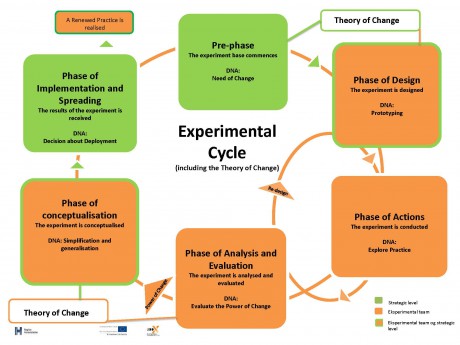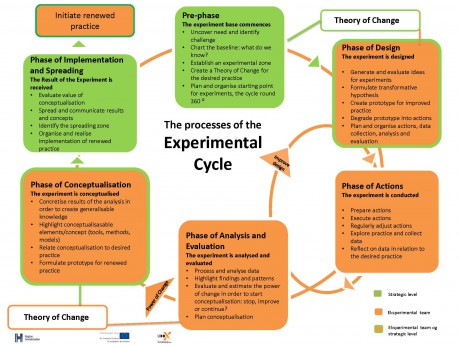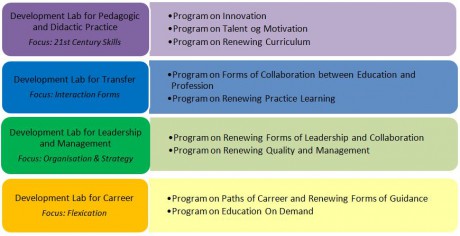In English
Here you will be presented with:
- Introduction to the project – The Educational Experimenting Laboratory
- Overview of the Laboratories and programmes
- The Experimental Cycle – Educational Experiments as a new way to improve practice
Materials:
- Presentation Of The Educational Experimenting Lab
- See the Educational Labs article in connection to the conference EAPRIL 2014 in the Conference Proceeding on page 60
- See also The Educational Labs presentation from the conference
Introduction to the project – The Educational Experimenting Laboratory
The Educational Experimenting Laboratory is a large project involving 14 partners: 10 educational institutions and 4 research and development organisations that contribute with specific knowledge to the project.
The mission of the Educational Lab has been to establish an experimental setting based on knowledge by:
- Creating a unique experimental environment,
- Connecting educational practice, development and research to ensure knowledge that works in new ways,
- Developing new structures within the organization,
- Creating sustainable and meaningful partnerships (between different educational institutions and between educations and employers),
- Providing conditions for sustainable transformations that make the educational institutions able to address the present challenges and ensure that the educations are future -proof. Combining theoretical knowledge on the educational field with experiences of teachers, leaders and students this study provides answers on how to improve and renew practice.
The project approaches different national educational issues, both on structural and individual level such as lack of apprenticeships, the low status of VET and increasing drop out rates due to lack of motivation and personal issues amongst the youngsters.
We carry out experiments to find new solutions to these challenges.
Overview of the Laboratories and programmes
The project consists of four laboratories, as shown in the image below:
The partner organizations have completed more than 130 experiments in the different programmes.
View our Presentation Of The Educational Experimenting Lab
The Experimental Cycle – Educational Experiments as a new way to improve practice
In the Educational Lab an educational experiment is defined as:
“a systematically tested trial that has the aim of developing a new and
improved educational practice”
(Hutters & Sørensen 2013).
With the experimental approach we can create and try out new ideas that direct a new practice. Thereby practice and research can work together to renew and improve the daily practice of education. The aim of creating educational experiments speaks to a tendency that social experiments are important as a method to create social innovation and practice-based solutions on actual and real problems (Ravn 2006).
In order to structure educational experiments we have developed a two-sided model of the Experimental Cycle (cf. Figure 1 & 2). The model has been designed throughout the project in collaboration between practice and research. During the process we have continuously gained feedback from teachers and leaders, who are the end-users of the model. In contexts of the development of the experiments and the experiences related here to, the model has been adjusted.
The model shown in Figure 1 and Figure 2 below builds on seven prototypes of the cycle.

Figure 1: The Experimental Cycle (The Vocational Education Lab 2014)

Figure 2: The Processes of the Experimental Cycle (The Vocational Education Lab 2014).
Figure 1 & 2 show that the Experimental Cycle consists of six phases: The Pre-phase, the Design-phase, the Phase of Actions, the Phase of Analysis and Evaluation, the Phase of Conceptualisation and the Phase of Implementation and Spreading. While Figure 1 shows the general model of the Experimental Cycle, Figure 2 shows an unfold version of the model including the specific processes of the six phases.
In the first prototype of the Experimental Cycle there was only four phases. Based on the feedback and the experiences of practice, the Experimental Cycle has been systematically developed. The green colour illustrates, that a strategically level of the organisation should carry out the processes. The orange colour illustrates that the processes should be conducted by the Experimental Team, who execute the experiment. The Theory of Change, that is included in the model, refers to a complementary tool that can be used to measure and direct the change of the experiment, and the realisation of new practice (The Voational Education Lab 2014). The specific processes of each phase shown in Figure 2 function as guidelines for the content of the phase, and are intended to support the development of an Educational Experiment that creates value to educational practice.
In December 2014 The Educational Experimenting Laboratory has participated in the international conference EAPRIL, European Association for Practitioner Research on Improving Learning. All the workshops that was presented has practice-based research in a learning context as the focal point and some of them have produced an article about their research. Read the Conference Proceeding here and see our contribution on page 60. See also The Educational Experimenting Laboratory presentation from the conference.





